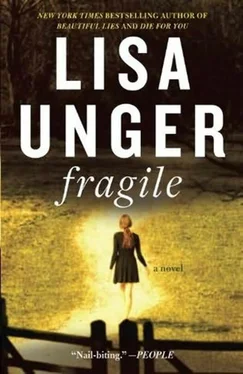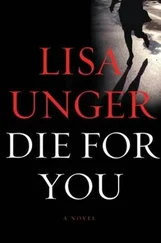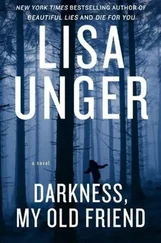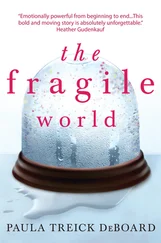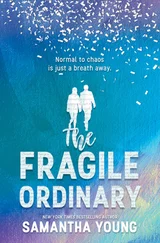But before she headed out the door, something made her turn around and pick up the phone again. She glanced at the clock as she dialed the number she, for whatever reason, knew by heart, though she rarely had reason to call Henry Ivy at home. Maybe it was because he’d had the same number since he was a kid, living in the house where he grew up, though his parents had long ago retired to Florida. He answered quickly, sounding alert and wide awake.
“It’s Maggie.”
“Maggie. What’s wrong?”
“I’m coming to get you. I need your help.”
She heard the squeaking of his mattress, the pushing back of sheets. “Okay,” he said. “I’ll be ready.”
The sky above them was a field of stars. Jones stared up at the swaying tips of the towering pines. If he just kept looking up, maybe when he looked down again, it would all be a dream, a mistake, a horrible imagining. But no. Melody sat cross-legged beside Sarah, holding her white hand. She was rocking, singing something softly.
“We have to get out of here,” she said when she saw him watching her.
“We have to call the police,” said Jones, rising. He realized that he was crying, that his face was wet with tears. He wiped at them with his sleeve, but they just kept coming.
“Did you kiss her?” Melody asked, apropos of nothing.
“No.” He looked at Sarah’s body and knew that they were all standing before a chasm of pain and grief, that life as they knew it had ended. He’d see her again and again over the years, every time he looked at a corpse lying crooked on the ground. It was always the same feeling, the pointless rise of wishing things were different, of knowing that things could not be undone, that these were the last peaceful moments before someone, somewhere, would be crushed by sorrow.
“We have to go,” she said. “He’ll find a way to pin the blame on us. He’ll bring his father back here, and they’ll find a way. He weasels out of everything.”
Jones was about to protest. But Melody interrupted.
“It’s your car. You picked her up. I brought the weed. I’m high right now. We have to leave. Sarah’s gone. There’s nothing we can do for her.”
Looking back now, he remembered that she was level, logical even, far beyond her years. He felt near hysteria, about to shake apart at the seams. She stood and started leading him away from Sarah’s poor, broken body.
“We can’t just leave her here,” he said. “We’ll call the police and tell them it was an accident. It was an accident.”
“We have to go. I don’t want my life to end here tonight, too.”
Later, during the one and only conversation they had about that night, Melody would swear that it was he who wanted to leave, she who wanted to stay and call the police. Melody would claim that he was the one who dragged her toward the car, while she protested loudly. But Jones didn’t remember it that way. As he remembered it, they both walked back to the Mustang. He opened the door for her, as he’d been taught to do, and she climbed inside. They left Sarah. They left her there in the woods, in the dark, alone. Jones fought the rise of bile all the way back to Melody’s place.
“Follow his lead,” she said. “If we follow him, we’ll be all right.”
He agreed. Even as she left the car, the events of the evening seemed distant and strange, as if it were something he’d watched on television as he drifted off to sleep-fuzzy, indistinct, unreal.
When he pulled into his driveway, his mother was waiting at the door. She was always waiting at the door, or at the window, as if she expected daily for him not to return home.
“You’re late,” she said. She pushed the screen door open for him. “I kept a plate warm.”
“Sorry,” he said. “I gave Travis Crosby a ride home.”
“Where’s your jacket? It’s cold.”
Where was his jacket? He remembered, then, wrapping it around Sarah’s tiny shoulders. She’d cast it to the ground when she ran from Travis. He’d forgotten it. He didn’t remember seeing it in the parking lot when they returned to the car. But he didn’t remember much; he’d left there in a shocked daze. Did Travis take it? That’s when he remembered that her things-her book bag, her violin case-were still in the trunk of the car. He felt his knees start to buckle with the weight of it, and the next thing he knew, he was kneeling by the stairs, his head in his hands.
“Jones! What’s wrong? What is it?”
He told her. He told her everything that happened from the minute he picked up Travis until he dropped off everything. And when he was done, he sagged with relief. His mother had come to sit beside him on the staircase, pulled her knees up inside her tattered white housedress. He was afraid to lift his eyes from his hands to look at her face. Instead he looked at the papery skin of her ankles, all the millions of purple spider veins along her legs. When he found the courage to lift his eyes, she was staring at him, the look on her face unreadable.
“Mom. We left her there. She’s still there,” he said.
“How could you do this?”
“I don’t know. I don’t-,” he said. “What should I do?”
“After everything I’ve done for you. How could you do this to me?”
He stared at her, incredulous. “To you?”
“They’ll take you away from me.”
“Mom.” He couldn’t believe what she was saying.
She had a crazed light in her eyes. “You’ll do what that girl said. You’ll keep your mouth shut and follow Travis Crosby’s lead.”
“But-,” he said. The ground beneath his feet felt like it was made from fog; he couldn’t find firm footing. “She’s still out there.”
His mother came to kneel beside him and grabbed him by the shoulders. Her breath in his face reeked of cigarette smoke.
“You listen to me. She’s dead and gone. There’s nothing you can do for her. Do you want to flush your whole life down the toilet?”
But they both knew it wasn’t about him or about his life. Somehow it had become about his mother and what he had done to her, how this might ultimately take him from her. He looked at her, her hard, dark eyes, her thin line of a mouth pressed tight, her white skin flushed with emotion. She didn’t care about him, or about a girl left dead in the dark.
“It’s not right.” The words sounded weak and lame because he stayed rooted on the stairs.
But she didn’t seem to hear him anyway. “If it ever comes down to it, I’ll swear you came right home. Who do you think they’ll believe-that little druggie tramp and that delinquent Crosby kid, or me?”
He just sat listening to her go on. She ranted as she ushered him into the kitchen and put a plate of food before him. It smelled vile. Abigail was a horrible cook, everything either overseasoned or undercooked. He pushed his food around his plate, swallowed a few bites to appease her.
The rest of the evening passed in a blur-a shower, homework, then to bed like any other ordinary night. Except he was still in the park with Sarah, and she was alive, and he kissed her. And maybe he’d ask her out for Friday night. She was a nice girl; he liked the way he felt when she was sitting in his car. He wondered what it would be like to hold her hand. And then she was lying on the ground, stiff and growing cold.
After his mother went to sleep, he looked out his window to see that a light snow had started to fall. He couldn’t take it anymore. He couldn’t leave her there. He grabbed a coat from the closet and left the house, letting the Mustang roll in reverse from the drive, starting it only when he was in the street. Even so, as he drove off, he saw his mother’s bedroom light come on.
When he got to the park, the lot was covered in a brittle layer of glittering snow. The vehicle gate had been closed and locked. In all the years he’d been coming there, it never had been before. He left the Mustang at the gate and easily climbed over. He felt the cold prickle of snow on his face, neck, and hands.
Читать дальше
